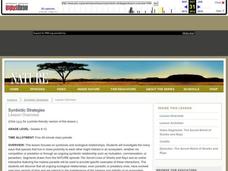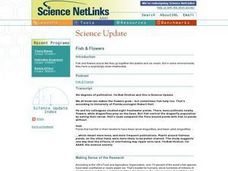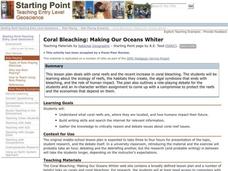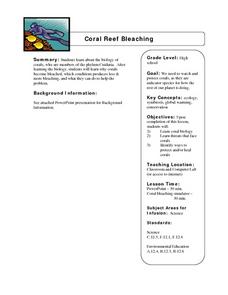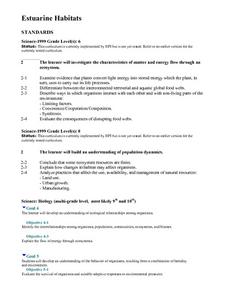Pace University
Grades 6-8 Ecology
Why are our national parks important? Scholars research the national parks and explore the basic ecology of these areas in a differentiated instruction unit on ecology. They learn about ecosystems, food chains, symbiosis, and biomes. The...
Curated OER
Ecology: Symbiosis
Eighth graders identify various types of symbiotic relationships. In this ecology lesson plan, 8th graders predict whether certain organisms can form symbiosis with other organisms. They discuss and defend their reasoning.
Curated OER
Symbiotic Strategies
Young scholars explore the different interspecies relationships namely mutualistic, commensal and parasitic. In this ecology lesson, students investigate an ecosystem disrupted by humans. They formulate an action plan to save it and...
PBS
Symbiotic Strategies: The Secret Lives of Sharks and Rays
Learners investigate the interaction in an oceanic ecosystem. For this symbiotic relationship lesson, high schoolers investigate how ecological relationships evolve over long periods of time in order to maintain balance and stability of...
Curated OER
Fish and Flowers
Students read and discuss a research article that explains the unlikely link between increased fish populations and increased plant pollination. They answer reading guide questions to discover this ecological relationship.
Curated OER
Cool Corals
Students research questions pertaining to ecology and biology of shallow and deep water corals. In this investigative instructional activity student get into groups and design questions that will expand their knowledge of corals.
Alabama Learning Exchange
Make a Difference!
We are very dependent upon other life forms around us to survive. Here, scholars explore relationships in the ecosystem with the help of Auntie Litter and the pollution patrol. They imagine a world without grass, making connections to...
Curated OER
A Coastal Arctic Food Web
Students create a food web of the arctic ecosystem. In this biology lesson, students explain how global warming affects this ecosystem. They explain how losing a species affects the entire community.
Curated OER
Endosymbiosis: A Friend Within
Students research the ecological principle of symbiosis. Using a microscope, students observe the relationship of mutualism between termites and flagellates. Students examine a live termite and protozoans. They discuss the principles...
Curated OER
The Environment and Interactions of Living Organisms
Students study the environment and interactions of living organisms. They identify abiotic and biotic factors and create a foldable and vocabulary cards. They create a poster illustrating soil and watch a video to study symbiosis.
Curated OER
Mealtime for Corals
Students explore how coral polyps feed. In this science lesson, students participate in an interactive game to demonstrate how polyps within a coral colony feed. Students become coral polyps and demonstrate how they feed in this lesson.
Ocean Explorer
Living with the Heat
Young oceanographers study the Submarine Ring of Fire, which is a series of deep-water volcanic vents that come up from the ocean floor. Learners take a close look at the unique ecosystems that are associated with these areas, how these...
Curated OER
Coral Bleaching: Making Our Oceans Whiter
Students study coral reefs and the controversy over coral bleaching. They role-play a debate over the issue and come up with a compromise to protect the reefs and the economies that depend on them.
Curated OER
Animated Video Productions - Life Cycles
Seventh graders compare/contrast the life cycles of free-living organisms to that of parasites. They conduct Internet research, illustrate the stages of a specific organisms's life cycle, and direct and produce a mini-video production.
Curated OER
Coral Reef Bleaching
Young scholars explore the structural biology of corals. Working individually, students identify how corals become bleached and which conditions produce more and less coral bleaching. Young scholars explore how this effects the...
Curated OER
What Role Do Forest Play in Continuing or Renewing Our Planet's Resources?
Learners explore the interaction between the forest and wildlife. In this forestry lesson, students collect data about forest ecosystems, species of trees, photosynthesis, and interaction of organisms. They prepare a lab activity to...
Curated OER
A Reef of Your Own
Students research and study the life and reproductive strategies of reef building corals. They examine how coral reefs can produce high levels of biological material when they are surviving in areas of low nutrition.
Curated OER
Choose Your Defense: Spines, Vomit and Camouflage
Young scholars investigate defensive mechanisms of insects and organisms. In this biology lesson, students draw imaginary caterpillars as well as imaginary parasites that will harm the caterpillar. Young scholars utilize the Internet...
Curated OER
C.S.I. on the Deep Reef
Students study chemotropic sybioses and chemotropic nutrition. In groups, they complete a Chemotrophic Species Investigations (CSI) Worksheet.
Curated OER
Estuarine Habitats
Sixth graders study the important habitats, flora, fauna, and physical factors of coastal habitats. They compare the aquatic habitats to terrestrial habitats by researching and completing tables with the information.




